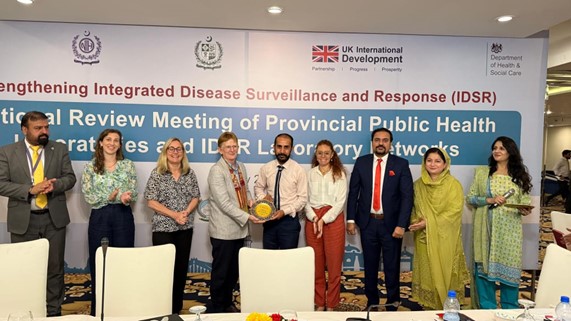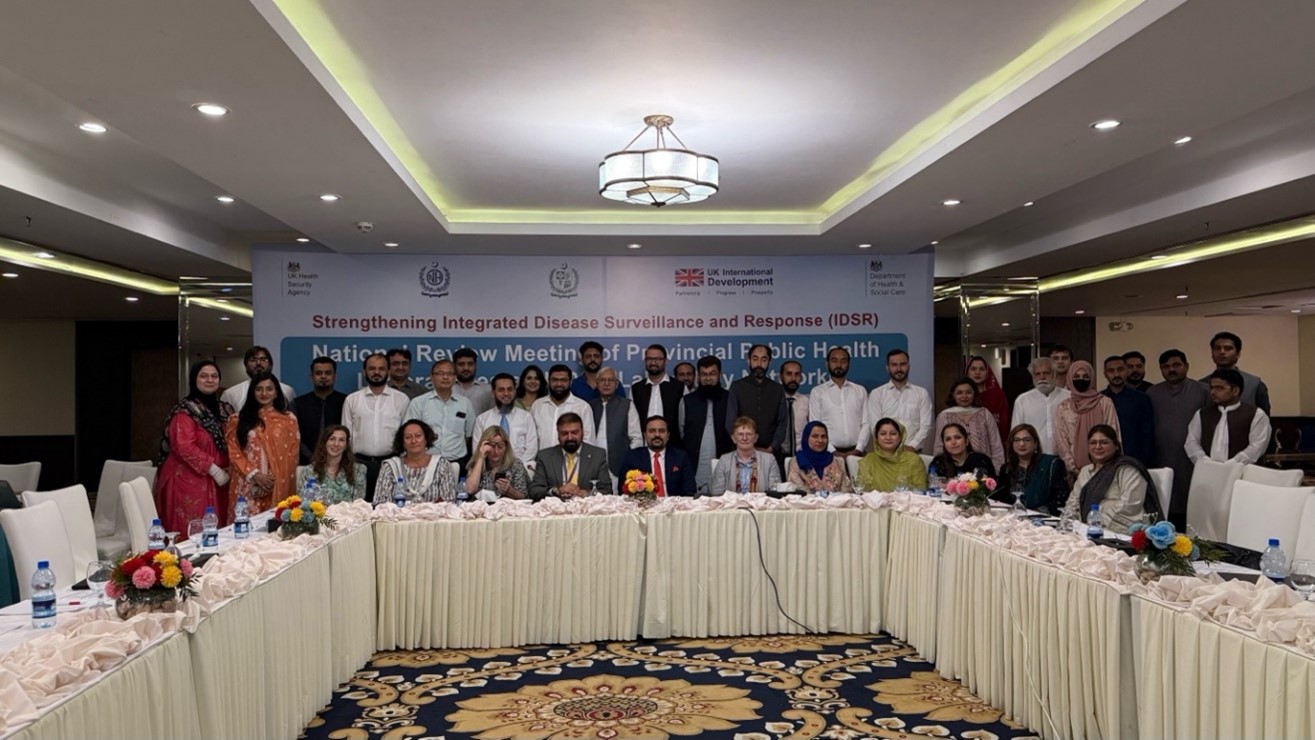
On 9 July 2025, over 30 key stakeholders gathered in Islamabad to review progress on the Pakistan’s network of Provincial Public Health Laboratories (PPHLs) - a network that is strengthening how Pakistan detects and responds to health emergencies. The National Institute of Health (NIH) convened the National Review Meeting of the IDSR Laboratory Networks with technical support and collaboration of the UK Health Security Agency’s (UKHSA) International Health Regulations Strengthening Project (IHR-SP). This regular national forum brings together Heads of PPHRLs to share learning and experience, highlight issues, discuss solutions and agree on practical actions.
Attendees included all six PPHL leads, Provincial Integrated Disease Surveillance and Response (IDSR) focal persons, senior officials from the Ministry of National Health Services, Regulations & Coordination (MoNHSR&C), the Head of UKHSA IHR-SP, senior representatives from the UK Department of Health and Social Care (DHSC) and the Fleming Fund, the in-country IHR-SP team, technical experts from WHO, and other development and technical partners.
A new era for disease detection
The meeting celebrated a significant achievement in Pakistan's public health laboratory journey. "For the first time, our laboratory is systematically sharing data with surveillance units. It is a shift from working in isolation," said one Provincial Public Health Laboratory lead.
This transformation reflects Pakistan's broader transition from relying on a single national laboratory to establishing fully functioning PPHLs across the country. The IHR-SP's in-country Microbiologist presented progress on establishing the laboratory network across Pakistan, guided by the agreed Pakistan Roadmap for Public Health Laboratories.
Laying the groundwork
The UKHSA IHR-SP Laboratory Team and NIH have jointly conducted assessments in three provinces, providing a clear picture of where targeted support is needed. The IHR-SP team shared key findings that will shape future interventions to strengthen the network nationwide.
Representatives from all six PPHLs presented their achievements, challenges, and proposed solutions. The exchanges allowed laboratory leaders to learn from one another's operational and financial strategies - building a community of practice that strengthens the entire system.
Planning for the long term
A thought-provoking discussion, moderated by the IHR-SP Deputy Country Lead, focused on the sustainability of public health laboratories, the connections between surveillance and laboratory systems, and provincial AMR-related initiatives. Participants explored how laboratories can operate independently of external support, with particular emphasis on financial sustainability, human resource planning, and government ownership.
While some provincial IDSR projects include funding for PPHLs, creating a truly functional network requires dedicated provincial budgets and stronger local ownership. Laboratory heads also shared their operational and financial strategies, allowing colleagues to learn from one another and exchange best practices. Given Pakistan’s provincial autonomy, these forums remain essential for aligning provinces and agreeing consistent and practical steps.
The meeting also provided an opportunity to explore how antimicrobial resistance (AMR) work can be integrated with the developing IDSR lab networks.
Impact when it matters most
These efforts are already making a difference. During COVID-19, monsoon floods and Mpox outbreaks, Pakistan's public health laboratories have demonstrated their vital role in supporting timely responses. Strengthening this network means faster detection, quicker confirmation, and more effective outbreak control.
The meeting ended with the distribution of shields to PPHL leads in recognition of their continued dedication to strengthening disease surveillance.
Looking ahead
The forum agreed that future meetings will focus on developing and strengthening laboratory networks within each province, improving laboratory data flow, and advancing AMR integration – all essential steps towards building a resilient, responsive and self-reliant laboratory system capable of protecting Pakistan’s population from emerging health threats.
Also By
- First-of-its-kind Community-Based Surveillance Training in Mardan to Boost Pakistan’s Disease Preparedness and response
- Emergency disease surveillance system in action for recurrent floods in Pakistan
- Expanding Sindh’s Integrated Disease Surveillance and Response Network (IDSR) Laboratory Network to private laboratories
Useful Resources
Related Articles
-
Gilgit-Baltistan launches new laboratory network in efforts to strengthen Integrated Disease Surveillance and Response across Pakistan
BY Dr Muhammad Sartaj, Sumera Abid -
Building a stronger health partnership with academic institutions for strengthening IHR in Pakistan: IDSR training for Master Trainers at The Institute of Public Health, Lahore
BY Dr Muhammad Sartaj -
Pioneering training on “District Health Information System-2” to strengthen Integrated Disease Surveillance and Response System in laboratories in Sindh province of Pakistan
BY IHR -
Expanding Sindh’s Integrated Disease Surveillance and Response Network (IDSR) Laboratory Network to private laboratories
BY Sumera Abid, Dr Muhammad Sartaj -
From vision to action: Sindh’s IDSR Lab Network Review marks key progress in Pakistan’s IDSR journey
BY Dr Muhammad Sartaj


Please Sign in (or Register) to view further.